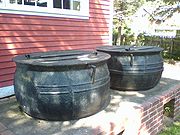
Trywork
Encyclopedia

Aft
Aft, in naval terminology, is an adjective or adverb meaning, towards the stern of the ship, when the frame of reference is within the ship. Example: "Able Seaman Smith; lay aft!". Or; "What's happening aft?"...
of the fore-mast
Mast (sailing)
The mast of a sailing vessel is a tall, vertical, or near vertical, spar, or arrangement of spars, which supports the sails. Large ships have several masts, with the size and configuration depending on the style of ship...
, is the most distinguishing feature of a whaling ship.
In two cast-iron trypots set into this furnace of brick, iron and wood, whale oil
Whale oil
Whale oil is the oil obtained from the blubber of various species of whales, particularly the three species of right whale and the bowhead whale prior to the modern era, as well as several other species of baleen whale...
was rendered from the blubber
Blubber
Blubber is a thick layer of vascularized adipose tissue found under the skin of all cetaceans, pinnipeds and sirenians.-Description:Lipid-rich, collagen fiber–laced blubber comprises the hypodermis and covers the whole body, except for parts of the appendages, strongly attached to the musculature...
of whale
Whale
Whale is the common name for various marine mammals of the order Cetacea. The term whale sometimes refers to all cetaceans, but more often it excludes dolphins and porpoises, which belong to suborder Odontoceti . This suborder also includes the sperm whale, killer whale, pilot whale, and beluga...
s, much as grease is rendered from frying bacon. The furnace is temporarily affixed to the deck by "iron knees", and a reservoir of water under the bricks keeps the heat from burning the wood of the deck.
In the 18th- and 19th-century New England
New England
New England is a region in the northeastern corner of the United States consisting of the six states of Maine, New Hampshire, Vermont, Massachusetts, Rhode Island, and Connecticut...
whaling industry, the use of try-works (two large try pots in a brick furnace) to use on a whaling ship allowed them to stay at sea longer and boil out their oil. The slices of blubber were kept as thin as possible for the process, and on New England whaling ships, these slices were called "bible leaves" by the sailors.
Try-works being used at sea on board a ship was the major technological innovation that enabled the success of the Yankee
Yankee
The term Yankee has several interrelated and often pejorative meanings, usually referring to people originating in the northeastern United States, or still more narrowly New England, where application of the term is largely restricted to descendants of the English settlers of the region.The...
whaling industry.
Further reading
- "Trying Out the Oil", chapter in the book by Peter Cook, You Wouldn't Want to Sail on a 19th-Century Whaling Ship!, New York : Franklin Watts, 2004. ISBN 0-531-16399-7
External links
- "A Whaling Trypot", National Maritime MuseumNational Maritime MuseumThe National Maritime Museum in Greenwich, England is the leading maritime museum of the United Kingdom and may be the largest museum of its kind in the world. The historic buildings forming part of the Maritime Greenwich World Heritage Site, it also incorporates the Royal Observatory, Greenwich,...
, London

